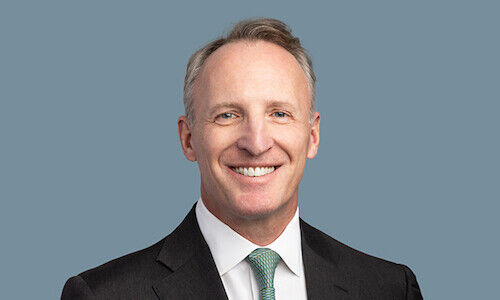Boris Collardi has taken an $80 million stake in Swiss private bank EFG. He didn't do that just to keep the status quo.
The consolidation underway in Swiss private banking is now decades old, and it is a saga that thrives on rumor and speculation – and the occasional acquisition and merger.
There are now some indications that something is up in the sector given the current rumors of a merger between EFG International and J. Safra Sarasin.
Share Prices Up
Both of the institutes declined to comment when asked.
While most rumors and speculation in the market have very little in the way of any economic or business logic. there are some arguments in favor of a tie-up between both EFG and Safra.
It is also very noticeable that EFG shares have risen, practically unnoticed, by 15 percent over the past three months even though the Swiss Market Index (SMI) has hardly moved in that time.

Boris Collardi (Image: Keystone)
Enter Collardi
There is one thing that has caught everyone's breath related to EFG this year. The news of Boris Collardi becoming a shareholder. The long-tenured former Julius Baer CEO, also briefly partner of Geneva private bank Pictet, bought a 3.6 percent stake in EFG for about $80 million at the end of April.
The 48-year-old executive from Suisse Romande is known for his hands-on style. While at Julius Baer, a veritable succession of deals kept him in the limelight, particularly 2012's acquisition of the international wealth management business of US brokerage Merrill Lynch.
Takeovers and Scandals
It remains the largest deal of the last ten years and it was inordinately complex to complete. But Collardi managed to integrate the business in record time, laying the fundamentals that the bank is currently known for.
Julius Baer also tested the limits of its risk capacities and was confronted by numerous scandals. That triggered a number of far-reaching investigations by Swiss regulator Finma, and something that ultimately prompted him to leave, as finews.com previously indicated.
He was then supposedly positioned to breathe new life into the noble, and discreet, hallways of Pictet. But he didn't manage. He joined the institute in 2018 as a partner, only to leave again in August 2021. The Finma investigations of Julius Baer weighed too heavily and unsettled many of Pictet's major clients.
Finma Agreement
Industry circles indicate that Pictet and Finma reached an agreement whereby the regulator would stop all investigations against him provided that he left the private bank in a reasonable timeframe.
Now, he is back in business. In October 2022, he is expected to be elected to EFG's board of directors. On the same date, further changes to the board are also expected.
New Plans

Alexander Classen (Image: EFG)
The former head of Coutts International and CEO of HSBC's Private Banking business Alexander «Alex» Classen is to replace Peter Fanconi as chairman. It does not take too much imagination to see that the new members of the board will be contributing something decidedly new.
EFG International is about to start implementing a three-year 2023-2025 business plan, which will be presented to investors in October. By that time, it will be interesting to see how much the picture for private banking has darkened or not.
Critical Mass
The sector is undoubtedly profiting from higher interest rates. But at the same time, clients are increasingly uncertain as a result of the Ukraine war, high inflation, and the possibility of a recession. Many have already lost a great deal of money and are holding back with new investments. These developments will weigh heavily on many banks over the next few months.
At the same time. the environment for assets under management, an important industry metric, is steadily getting worse. That will raise questions about critical mass in private banking over time. Such an environment will also make it difficult for Collardi to get a return on his investment, at least in a reasonable timeframe.
Brazilian Receptiveness
That is where Bank J. Safra Sarasin comes into play, according to industry circles. The Brazilian-Swiss institute is not only one of the most successful of its kind, but it is also one of the most discrete. It is also a well-known fact that the family owners reinvest profits back in the business.
That means they would have plenty of cash to make acquisitions. It has also been hiring teams from competitors, and even buying up banks, with regularity. That includes the Asia wealth management business of the Bank of Montreal. It has also opened an office in Madrid while fully taking over the Swiss online bank Zweiplus.

Juerg Haller (Image: J. Safra Sarasin)
Global Consolidator
«We continue to see ourselves as a consolidator in global private banking. Acquisitions in all regions are possible from that perspective.», J. Safra-Sarasin chairman Jurg Haller told finews.com a few months ago.
EFG International and Bank J. Safra Sarasin would have about $380 billion in client assets if they merged. They would overtake Lombard Odier, which had roughly $360 billion based on their last, disclosed figures. J. Safra Sarasin employs 2,300 from 25 locations while EFG International has 3,000 staff in 40 locations.
Among Themselves

There would be overlaps if both were to merge. The same was true when Julius Baer took over Merrill Lynch's business but Collardi quickly stamped them out then. Now, he would bring a tremendous amount of know-how to any negotiations.
The Brazilians at J. Safra Sarasin would also be meeting their national counterparts from BTG Pactual were they to meet with EFG International to discuss a deal. They are the second largest group of shareholders behind the Latsis family, the Greek founders, which continued to have a 23.9 percent stake in EFG International according to the 2022 half-year report.
That all means that both parties are likely to understand each other well, at least culturally. All that likely suits Boris Collardi just fine.



























